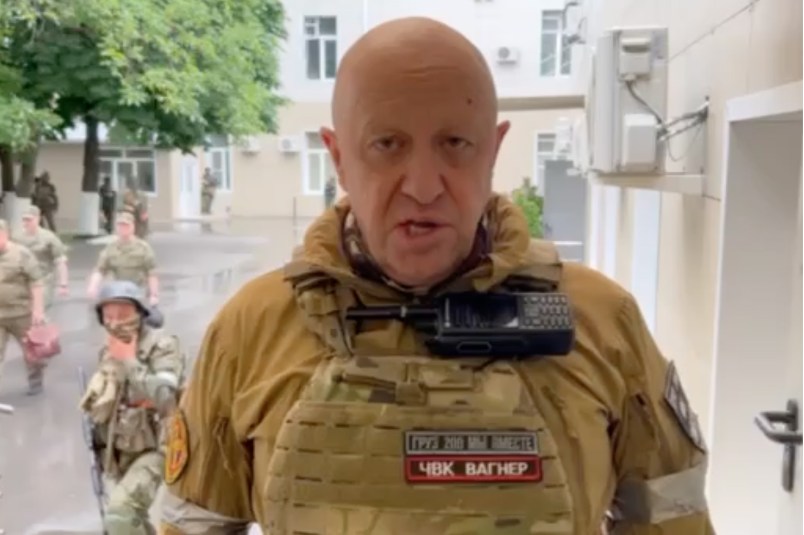Two months to the day after launching a mutiny against Russia’s military leadership, a plan belonging to Yevgeny Prigozhin crashed north of Moscow. Russian wire services cited government agencies as saying that Prigozhin was on board.
No agency has yet claimed that Prigozhin is dead; only that he was on a manifest listing passengers aboard the plane that crashed.
As with nearly everything to do with Prigozhin, and much to do with the Russian government, the details are murky.
Officials with Russia’s aviation authority said that Prigozhin was aboard an Embraer private jet which crashed north of Moscow on Wednesday.
Video posted online showed a burning plane in a field. Another showed what appeared to be a flaming aircraft falling from the sky, as someone offscreen says they heard two explosions.
RIA Novosti, a state news organization, ran a story with the headline “A private plane crashed in Tver region, Prigozhin was among the passengers.”
So far, the only information out there suggesting that Prigozhin was on board the plane comes from Russian authorities. So, it’s worth taking that with a grain of salt. Open source analysts said that a second plane belonging to Prigozhin, which had been flying the opposite route as the one which crashed, landed in Moscow on Wednesday.
Still, the end of Prigozhin’s story — if that’s what this is — would not necessarily come as a surprise. It was odd that he lived so long after launching what Putin himself called a “revolt.”
Prigozhin evolved from a St. Petersburg food magnate to a caterer to Putin to an all-around contractor for the Russian government. Earning the moniker “Putin’s chef,” he eventually took on the campaign of interfering in the 2016 presidential elections. The Mueller investigation accused Prigozhin of using his company Concord Management and Consulting to create networks of internet trolls during the campaign season that year as part of a broader strategy from the Russian government to sow chaos in the U.S. and boost support for Trump.
Starting in 2014 with Russia’s first invasion of Ukraine, Prigozhin also got involved in the more direct, military side of things. He founded Wagner Group, a mercenary outfit which acted on behalf of the Russian government in Ukraine, the Middle East, and Africa.
But after Russia’s full-scale invasion of Ukraine in 2022, Prigozhin and Wagner took on a bigger role in Russia’s military campaigns. Russia tasked Wagner with taking the Ukrainian stronghold of Bakhmut, expending what U.S. intelligence estimates said were 25,000 lives in the process — many of them Russian convicts.
Prigozhin used the backdrop of the battle to flaunt his own work for the Russian state, often claiming to appear near the frontline. He began to attack Russia’s military leaders in diatribes posted to social media, claiming that they were denying him ammunition while appearing next to piles of what he said were dead Russian soldiers to illustrate the point.
After Bakhmut fell to Wagner, Russia’s Ministry of Defense moved to absorb the mercenary group into its regular forces. Prigozhin refused, announcing in a June 23 voice recording that he was starting a “March of Justice,” with military columns headed towards the city of Rostov-on-Don, where Russia’s Ukraine operations are headquartered, and, from there, towards Moscow.
But what initially looked like a potentially successful coup attempt dissolved on June 24 as Prigozhin said that he reached a deal with Belarusian President Aleksandr Lukashenko to avert the march. He has rarely appeared in public since, with a number of outstanding questions from the event never being fully answered. His whereabouts have been largely unknown, though he has, at times, reportedly met with Putin.
Similarly, everything around Prigozhin’s potential demise Wednesday remains murky, beyond terse claims from state media that he was listed as a passenger on board the crashed jet. Reports that the jet was shot down continue to emerge on social media; Russian authorities have said only that the cause of the crash will be investigated.
Two months ago, Wagner’s soldiers appeared to have been able to make it much of the way to Moscow and to seize Rostov without any real resistance from Russian forces, though Prigozhin’s forces did shoot down several Russian military jets and helicopters during the march.
Since then, Russian authorities stepped up pressure on a crop of hardcore, right-wing nationalists who were, in a loose sense, similar in outlook to Prigozhin: they supported the invasion but had come to openly criticize the Russian government — sometimes including Putin himself — for its handling of the war. Russian authorities arrested Igor Strelkov, a pro-war critic of Putin’s who played a role in fomenting the conflict in 2014, in July.
Sergey Surovikin, seen as a relatively competent general who commanded the country’s forces in Ukraine for several months last year, reportedly was removed from his position on Tuesday. The New York Times, citing U.S. intelligence sources, reported that Surovikin knew about Prigozhin’s plans for the “March of Justice” in advance.
Some reports said that the rest of Wagner’s senior leadership were on board with Prigozhin. Russian state media reported that investigators were examining whether “flight safety rules” played a role in the crash.






